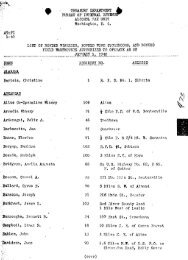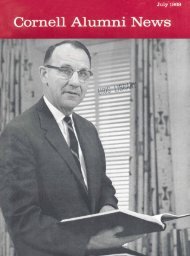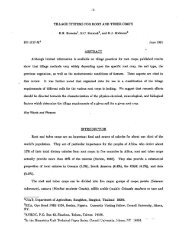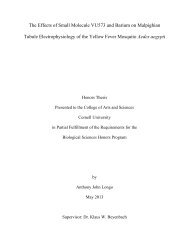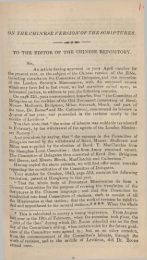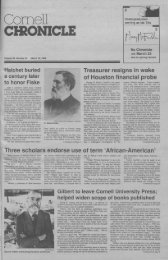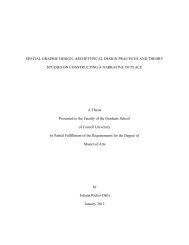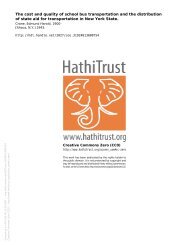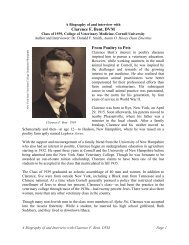1/1 - eCommons@Cornell - Cornell University
1/1 - eCommons@Cornell - Cornell University
1/1 - eCommons@Cornell - Cornell University
- No tags were found...
You also want an ePaper? Increase the reach of your titles
YUMPU automatically turns print PDFs into web optimized ePapers that Google loves.
I /***<br />
I<br />
Karl Linnas, deported<br />
shaken that Neal had methodically<br />
deconstructed his analysis." The<br />
witness appeared so physically shattered,<br />
Rosenbaum says, that Sher<br />
ordered one of his paralegals to<br />
check on the man outside the courtroom.<br />
As a government official, Sher<br />
was careful to follow guidelines. As<br />
OSI director he would not comment<br />
on politics, citing the 1939 Hatch<br />
Act restricting the political activity<br />
of government employees. And<br />
Rosenbaum remembers being<br />
chided by his former boss for dressing<br />
too casually on a day they were<br />
traveling on official Justice Department<br />
business. But Sher's acquiescent<br />
streak had its limits. "People<br />
here know that Neal has put his career<br />
on the line on a number of occasions<br />
to achieve a just result,"<br />
Rosenbaum says.<br />
One such case involved Karl<br />
Linnas, a Long Island man accused<br />
of heading the Tartu death camp in<br />
Estonia. Even though the OSI had<br />
obtained a court order to deport<br />
Linnas to the Soviet Union,<br />
Rosenbaum says, Sher was privately<br />
ordered by his superiors at the Justice<br />
Department to send Linnas to<br />
Panama—considered a more politically<br />
palatable place to send a former<br />
American citizen. Sher would not go<br />
along with the change, and Linnas<br />
was sent to the Soviet Union, where<br />
he died in 1987 just months after<br />
his arrival.<br />
One common question Sher confronts<br />
in many of his speaking and<br />
teaching engagements is what he<br />
has come to call "the small-fry ar-<br />
gument"—that hunting anybody but<br />
the master schemers of the Holocaust<br />
is a wasted effort, especially<br />
because most of the alleged war<br />
criminals are old men living out<br />
their lives in relative obscurity. That<br />
argument, he says in a rebuttal polished<br />
from years of use, "reflects a<br />
lack of sensitivity to what was going<br />
on. People almost naturally get<br />
desensitized because of the numbers<br />
killed in the Holocaust. Six<br />
million. You can't visualize individuals.<br />
You just see a statistic." He<br />
points to the OSΓs prosecution of<br />
Bohdan Koziy, a Fort Lauderdale<br />
man accused of killing Jews and<br />
other civilians as a Ukrainian police<br />
officer. (Koziy fled to Costa Rica after<br />
losing his citizenship, but before<br />
deportation hearings could begin.)<br />
Among the specific charges against<br />
Koziy, Sher says, was that while<br />
confronting a 4-year-old Jewish girl<br />
pleading for her life, "he put a gun<br />
to her head and blew out her<br />
brains." Some of the girl's surviving<br />
relatives attended Koziy's trial<br />
in Florida. "The point I make is that<br />
for that girl and her surviving family,<br />
the Final Solution, the Nazi regime,<br />
was not Hitler or Himmler or<br />
Eichmann, it was this guy. It took<br />
hundreds of thousands of these<br />
people, these so-called 'small-fry/ to<br />
turn what would otherwise have<br />
been a maniacal dream into a reality."<br />
Aaron Breitbart, a senior researcher<br />
at the Simon Wiesenthal<br />
Center in Los Angeles, says U.S.<br />
Nazi-hunting efforts serve an important<br />
purpose for the nation's future.<br />
"If you leave (suspected Nazi criminals)<br />
alone, you're sending the<br />
younger generation the wrong signals,"<br />
Breitbart says. "What you're<br />
telling them is Ίf you are smart<br />
enough to avoid detection and capture<br />
for a long time, society will reward<br />
you by letting you get away<br />
with the most heinous of crimes.'"<br />
CORNELL MAGAZINE<br />
40<br />
Perhaps that's why Sher regularly<br />
returns to <strong>Cornell</strong> to teach his<br />
craft to students, many of them aspiring<br />
attorneys. The Near Eastern<br />
studies department frequently offers<br />
his class, "Jurisprudence and the<br />
Holocaust." He has also taught two<br />
more specialized courses: one on<br />
world response to the Holocaust,<br />
and one on the case of Final Solution<br />
mastermind Adolf Eichmann,<br />
who was tracked down in Argentina,<br />
kidnapped by Israeli agents and spirited<br />
to Israel, where he was tried<br />
and executed.<br />
"It's always stimulating to deal<br />
with undergraduates who clearly<br />
have a real interest in this subject,"<br />
Sher says. "I think that to these<br />
people, many of whose parents or<br />
grandparents lived through the war,<br />
the subject matter is very compelling.<br />
There's a sense that this is<br />
something that cannot be forgotten."<br />
he long lines at<br />
the United States<br />
Holocaust Memorial<br />
Museum in<br />
Washington and<br />
the box-office success<br />
of the film Schindler's List suggest<br />
an enduring quality to the<br />
memory of the Holocaust. What is<br />
undeniable, however, is that the day<br />
is coming when Nazi hunters like<br />
Neal Sher will not have any targets<br />
left to pursue.<br />
"It's very important, while we<br />
still have the chance, that the record<br />
be as voluminous as possible—to<br />
document what happened, who is<br />
responsible, who suffered," he says.<br />
"Because there are too many people<br />
who are willing to deny what happened<br />
or to minimize what happened.<br />
That, I'm sure, will increase<br />
when there are no longer survivors<br />
around. It's important that we build<br />
as strong a record as possible so we<br />
don't give Hitler a posthumous victory."<br />
a<br />
Laurence Arnold '88 is a reporter<br />
for the Asbury, NJ, Park Press.



